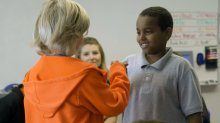SEL as a Foundation for Academics
These middle schools were built on the idea that academic risk taking, fostered by social and emotional learning, can be a key to high achievement.
Your content has been saved!
Go to My Saved Content.At Valor Collegiate Academies—two charter schools on one campus in Nashville that serve grades 5 through 8—the core philosophy is that “really strong SEL work is very advantageous to kids also doing well academically in school,” says Todd Dickson, who founded the schools with his twin brother, Daren. Structured community and character development programs like weekly Circle gatherings and advisory meetings called pride groups are deeply ingrained in the schools’ culture, and all students and teachers are expected to achieve fluency in the language of social growth and learning.
The fact that teachers participate fully isn’t an afterthought. Daren Dickson sees that decision as crucial to the school’s success, since “adults drive this kind of work”—and students seem to recognize the value of closing the distance between staff and student expectations. “It helps a lot, because they also know what we’re going through,” explains sixth-grade student Samiyah. “Other schools can say you don’t understand who your teacher is, but we can’t say that because they do the same thing as us.”
Valor believes that the resulting culture provides a safe space for academic risk taking—students have to “feel comfortable being OK that they don’t know everything” in order to learn, explains Todd Dickson. It also promotes communication and communal problem solving, and builds a strong foundation of self-knowledge and competency among community members.
It’s an approach that seems to be working: Valor Flagship Academy, the first Valor school, produced outstanding academic results, including the highest standardized test scores in the city and the state, in its first year of operation (2014–15). Valor will expand over time to cover grades 5 to 12, and students devote at least four hours a week to social and emotional learning (SEL)—over the course of eight years, a significant amount of time.
A Foundational Commitment to SEL
Valor’s SEL work is based on ideas that Daren Dickson developed throughout his career as a social worker, clinical and program director, and social justice advocate, including work he did at the nonprofit Seneca Center in the San Francisco Bay Area with vulnerable young people and communities.
Valor is intentionally diverse, with a student body that has no majority ethnicity—Sarah Giblin, principal of both schools, says that Valor is the first school in the state of Tennessee to make this a goal. Roughly half of the students receive free or reduced-price lunch. “We believe that, for our kids to be successful, we need to learn with and from people that are different,” says Giblin.
In addition to actively seeking diversity of opinions, Valor incorporates social and emotional learning and academic development through weekly community-enhancing Circle discussions—a model used by students and by teachers—and through .
Weekly Circles
Community building happens intentionally at Valor as students gather in groups of about 20 students led by an adult mentor. Circles begin with a mindfulness exercise, and then every students takes a minute to express how they are feeling—what Daren Dickson calls getting the “emotional tone” of the group. Next comes social and emotional work: Pairs of students may address interpersonal issues, or a student may take responsibility for actions that affected the community—an example of a restorative practice. Students also share academic work before concluding on a high note with peer-to-peer appreciations.
Like many schools embracing SEL nationwide, Valor has found that staff practices should mirror student practices. “I think having the adults do the practice themselves, and really know the importance of it, is our main strategy,” says Todd Dickson. He adds, “Circles are a time for the community to come together, and develop themselves as individuals, develop their relationships”—things that are as important for adults as they are for students.
The Compass Model
Valor’s Compass model has four dimensions, seeking to guide each student to develop a Sharp Mind (the pursuit of knowledge and skills) and a Big Heart (compassion for oneself and others) and to follow a Noble Purpose (one’s deepest values) through Aligned Actions (in part by being engaged and supportive of one’s community). Social and emotional learning is not seen as a soft skill: “We believe that that’s going to drive them to incredible academic success,” says Daren Dickson of the Compass work that students do.
Valor Collegiate Academies
Enrollment
1000 | Charter, UrbanPer Pupil Expenditures
$12487 DistrictFree / Reduced Lunch
56%DEMOGRAPHICS:
This story was produced by �鶹��ý��� as part of a series developed in collaboration with the National Commission on Social, Emotional, and Academic Development, with support from the Chan Zuckerberg Initiative.
